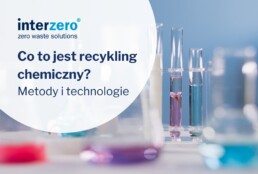Chemical recycling will recover raw materials from contaminated waste fractions
Raw material recycling involves the thermal decomposition of waste, which can produce liquid hydrocarbons or gases that are ingredients for the production of new raw materials. It is used to process certain plastics (e.g. PET, polyethylene, polypropylene). This type of recycling is more energy intensive and more expensive than material recycling, but allows waste that is highly contaminated or heterogeneous to be recirculated (and therefore unsuitable for material recycling).
According to experts, chemical recycling should complement the mechanical recycling currently used to process approximately 80% of plastics. The managing director of the Plastics Europe Poland Foundation, Dr Anna Kozera-Szałkowska, sees it as an opportunity to return to circulation raw materials that can be used for food contact or medical applications[i].
[i] Zero recycling point in Poland, https://portalkomunalny.pl/wp-content/uploads/2024/12/raport-punkt-zero-recyklingu-w-polsce.pdf
How does chemical recycling work? Methods and applications
The chemical recycling process uses 2 basic reactions: breaking and forming new chemical bonds. This means that the plastic particle (polymer) is broken down into smaller particles (including monomers) from which new polymers can be made in the next stage. This produces plastics with identical properties to virgin plastics derived from crude oil.
The most important technologies used during the chemical recycling process are:
- pyrolysis - thermal decomposition proceeding without oxygen. The result is, among other things, pyrolytic oil, from which, after purification and specialised treatment, ethylene and propylene can be obtained, i.e. the monomers that are the basic raw materials for the production of polyethylene and polypropylene,
- Gasification - thermal decomposition occurring when oxygen is available. Almost all plastics can be processed using this process,
- Solvolysis - an exchange reaction between polymer and solvent molecules. It is mainly used for the processing of PET.
However, pyrolysis and gasification do not fall within the statutory definition of recycling - The materials obtained from these processes are sometimes used as fuel. Thus, 'only' energy recovery occurs, which cannot be considered recycling. Nevertheless, pyrolysis is a promising method that can produce polymers with properties identical to those of virgin polymers.
Chemical recycling of plastics is a necessity, not an option
Chemical recycling is not currently used on a large scale. In the publication Plastics Europe[i] indicated that in 2023, only 0.12 million tonnes of plastics were produced in Europe through this process. However, many experts believe that this method should and must be popularisedespecially in the context of the continuing drive to increase plastic recycling levels. As Dr Anna Kozera-Szałkowska emphasises, the sanctioning of chemical recycling technology is also necessary in view of the forthcoming legal regulations concerning the increase in the recyclates content in consumer packaging[ii]..
At Interzero we understand these needs very well and we have long been taking steps to increase the scale of chemical recyclingand at the same time reduce the mass of raw materials going to thermal recycling, i.e. to waste incineration plants. To this end, we have developed a special process for sorting mixed plastics that were previously sent for incineration. In our method, the waste is not sorted into monomaterials, but into streams that are precisely tailored to the requirements of chemical recycling.
In 2023, together with OMV construction of the largest sorting plant for plastic waste has begunwhich will then be sent for chemical recycling. The new Interzero and OMV investment, which will be operational as early as 2026, will have a capacity of up to 260,000 mixed plastics per year.
Learn about all of Interzero's chemical recycling initiatives.
[i] Plastics Europe, Plastics - Facts 2024 in a nutshell, https://plasticseurope.org/pl/knowledge-hub/tworzywa-fakty-w-pigulce-2024/
[ii]. Zero recycling point in Poland, https://portalkomunalny.pl/wp-content/uploads/2024/12/raport-punkt-zero-recyklingu-w-polsce.pdf
